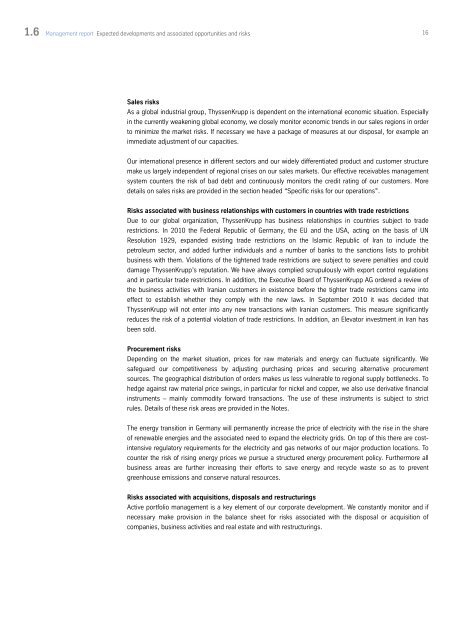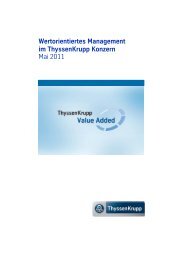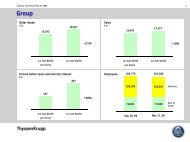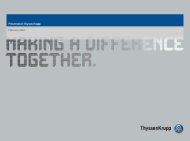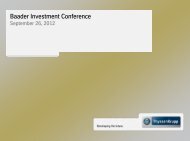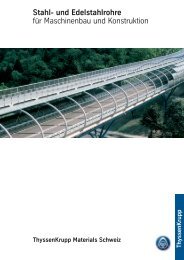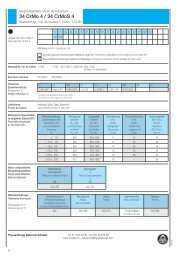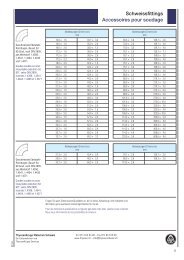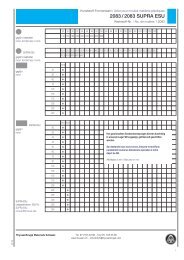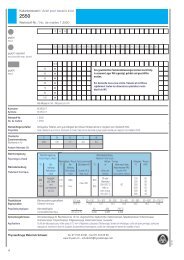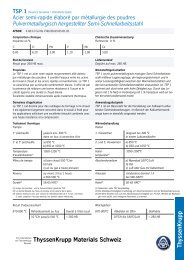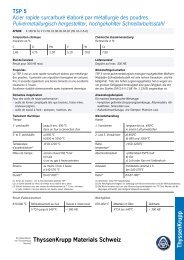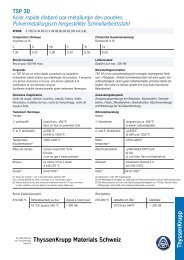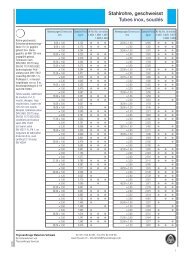Financial Statements and Management Report - Thyssenkrupp
Financial Statements and Management Report - Thyssenkrupp
Financial Statements and Management Report - Thyssenkrupp
Create successful ePaper yourself
Turn your PDF publications into a flip-book with our unique Google optimized e-Paper software.
1.6 <strong>Management</strong> report Expected developments <strong>and</strong> associated opportunities <strong>and</strong> risks<br />
Sales risks<br />
As a global industrial group, ThyssenKrupp is dependent on the international economic situation. Especially<br />
in the currently weakening global economy, we closely monitor economic trends in our sales regions in order<br />
to minimize the market risks. If necessary we have a package of measures at our disposal, for example an<br />
immediate adjustment of our capacities.<br />
Our international presence in different sectors <strong>and</strong> our widely differentiated product <strong>and</strong> customer structure<br />
make us largely independent of regional crises on our sales markets. Our effective receivables management<br />
system counters the risk of bad debt <strong>and</strong> continuously monitors the credit rating of our customers. More<br />
details on sales risks are provided in the section headed “Specific risks for our operations”.<br />
Risks associated with business relationships with customers in countries with trade restrictions<br />
Due to our global organization, ThyssenKrupp has business relationships in countries subject to trade<br />
restrictions. In 2010 the Federal Republic of Germany, the EU <strong>and</strong> the USA, acting on the basis of UN<br />
Resolution 1929, exp<strong>and</strong>ed existing trade restrictions on the Islamic Republic of Iran to include the<br />
petroleum sector, <strong>and</strong> added further individuals <strong>and</strong> a number of banks to the sanctions lists to prohibit<br />
business with them. Violations of the tightened trade restrictions are subject to severe penalties <strong>and</strong> could<br />
damage ThyssenKrupp’s reputation. We have always complied scrupulously with export control regulations<br />
<strong>and</strong> in particular trade restrictions. In addition, the Executive Board of ThyssenKrupp AG ordered a review of<br />
the business activities with Iranian customers in existence before the tighter trade restrictions came into<br />
effect to establish whether they comply with the new laws. In September 2010 it was decided that<br />
ThyssenKrupp will not enter into any new transactions with Iranian customers. This measure significantly<br />
reduces the risk of a potential violation of trade restrictions. In addition, an Elevator investment in Iran has<br />
been sold.<br />
Procurement risks<br />
Depending on the market situation, prices for raw materials <strong>and</strong> energy can fluctuate significantly. We<br />
safeguard our competitiveness by adjusting purchasing prices <strong>and</strong> securing alternative procurement<br />
sources. The geographical distribution of orders makes us less vulnerable to regional supply bottlenecks. To<br />
hedge against raw material price swings, in particular for nickel <strong>and</strong> copper, we also use derivative financial<br />
instruments – mainly commodity forward transactions. The use of these instruments is subject to strict<br />
rules. Details of these risk areas are provided in the Notes.<br />
The energy transition in Germany will permanently increase the price of electricity with the rise in the share<br />
of renewable energies <strong>and</strong> the associated need to exp<strong>and</strong> the electricity grids. On top of this there are costintensive<br />
regulatory requirements for the electricity <strong>and</strong> gas networks of our major production locations. To<br />
counter the risk of rising energy prices we pursue a structured energy procurement policy. Furthermore all<br />
business areas are further increasing their efforts to save energy <strong>and</strong> recycle waste so as to prevent<br />
greenhouse emissions <strong>and</strong> conserve natural resources.<br />
Risks associated with acquisitions, disposals <strong>and</strong> restructurings<br />
Active portfolio management is a key element of our corporate development. We constantly monitor <strong>and</strong> if<br />
necessary make provision in the balance sheet for risks associated with the disposal or acquisition of<br />
companies, business activities <strong>and</strong> real estate <strong>and</strong> with restructurings.<br />
16


